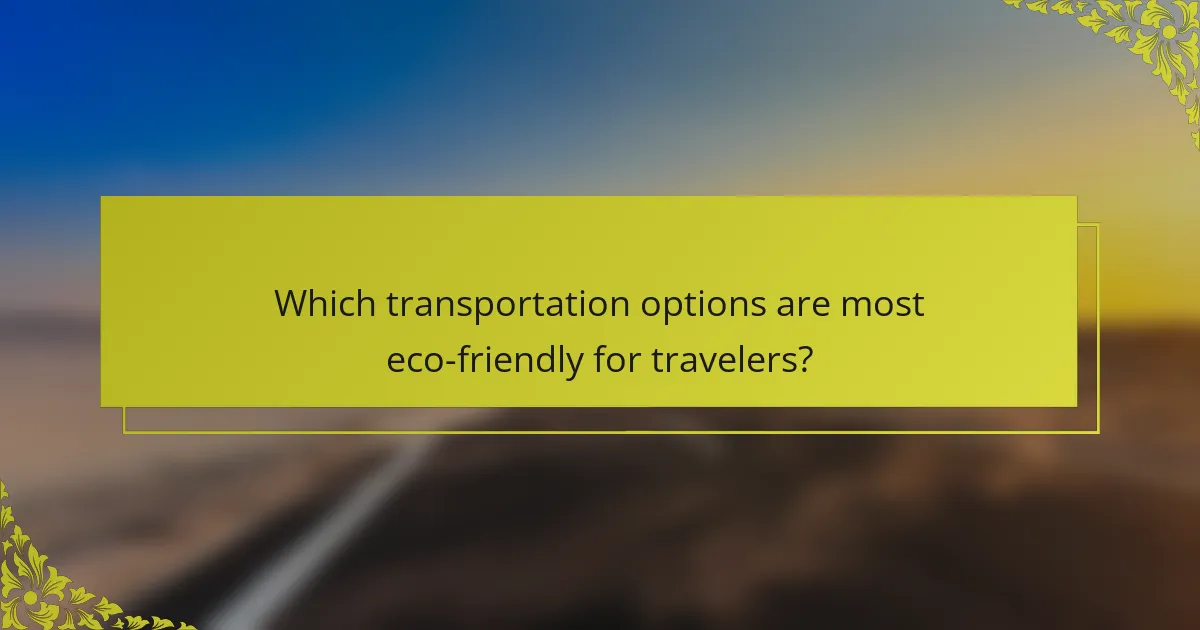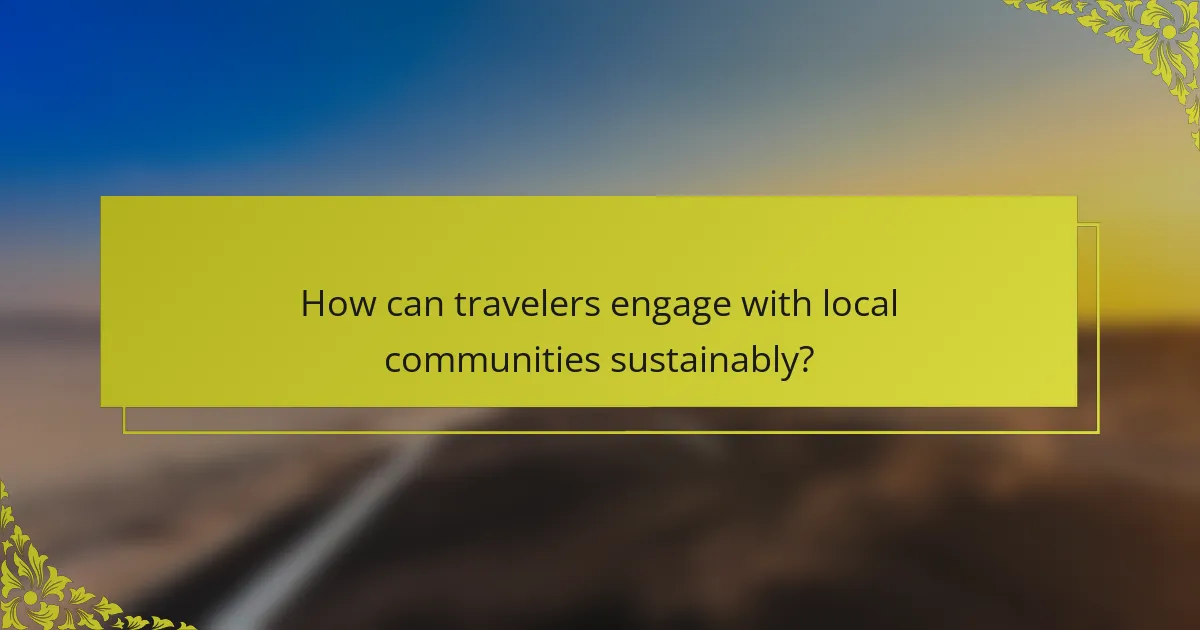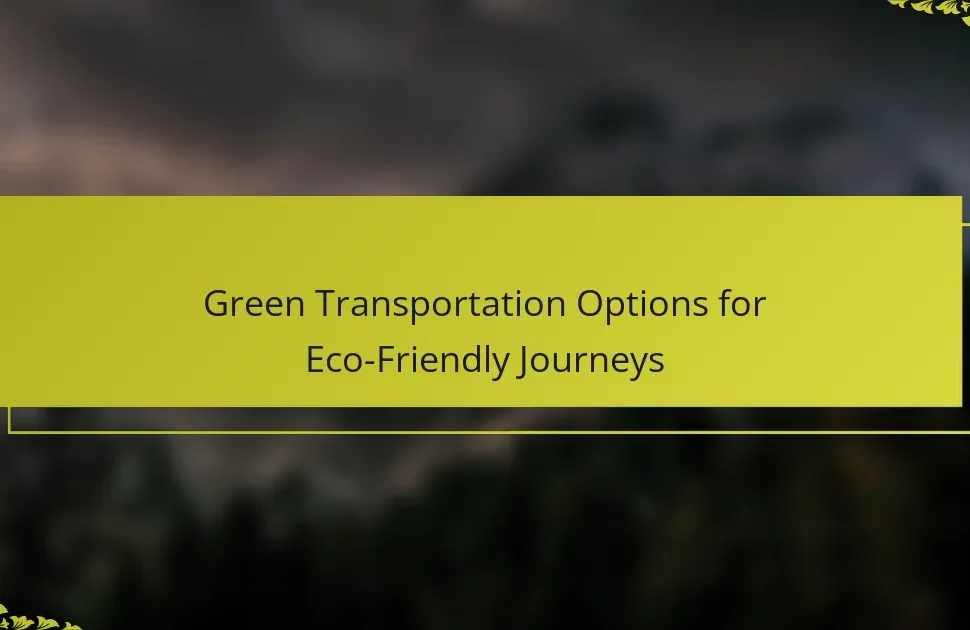Sustainable travel practices help eco-conscious adventurers minimize their environmental impact while enhancing local communities. Key aspects include choosing eco-friendly transportation, selecting sustainable accommodations, and engaging with local cultures. Understanding regional challenges and leveraging innovative technologies further support responsible tourism. By adopting these practices, travelers can enjoy enriching experiences while contributing positively to the destinations they visit.

What are the essential principles of sustainable travel practices?
Sustainable travel practices focus on minimizing environmental impact while enhancing local communities. Key principles include choosing eco-friendly transportation, supporting local economies, reducing waste, and respecting cultural heritage. These practices promote conservation and responsible tourism. For example, opting for public transport or cycling reduces carbon emissions. Engaging with local businesses fosters economic sustainability and cultural exchange. Reducing plastic use and prioritizing reusable items helps minimize waste. Ultimately, these principles empower travelers to contribute positively to destinations while enjoying enriching experiences.
How can eco-conscious adventurers minimize their carbon footprint?
Eco-conscious adventurers can minimize their carbon footprint by adopting sustainable travel practices. Prioritize public transportation, which reduces emissions compared to personal vehicles. Choose eco-friendly accommodations that implement green initiatives. Pack light to decrease fuel consumption during travel. Opt for locally sourced food to support sustainable agriculture and reduce transportation emissions. Engage in carbon offset programs to compensate for unavoidable emissions.
What role does wildlife conservation play in sustainable travel?
Wildlife conservation is crucial for sustainable travel as it protects ecosystems and promotes biodiversity. Responsible tourism practices support conservation efforts, ensuring natural habitats thrive. Eco-conscious adventurers contribute to local economies while minimizing environmental impact. This synergy enhances travel experiences and fosters a deeper connection with nature.

Which transportation options are most eco-friendly for travelers?
Public transportation, cycling, and walking are the most eco-friendly transportation options for travelers. These methods significantly reduce carbon footprints and promote sustainable travel practices.
Public transportation, such as buses and trains, uses less energy per passenger compared to private vehicles. For instance, a full bus can replace dozens of cars, leading to lower emissions. Cycling offers a zero-emission travel option, while walking contributes to personal health and reduces environmental impact.
Carpooling and electric vehicles also provide greener alternatives. Carpooling decreases the number of vehicles on the road, while electric vehicles have lower emissions, especially when charged with renewable energy.
Choosing eco-friendly transportation options not only benefits the environment but also enhances the travel experience through unique interactions with local communities.
How does public transport contribute to sustainable travel?
Public transport significantly contributes to sustainable travel by reducing carbon emissions and traffic congestion. It promotes eco-friendly commuting, making it easier for individuals to choose greener options.
Public transport systems, such as buses and trains, lower the number of individual vehicles on the road. This results in decreased greenhouse gas emissions, helping combat climate change. For instance, a full bus can replace multiple cars, leading to substantial reductions in overall emissions.
Additionally, public transport encourages urban density, which supports walkable communities. This reduces reliance on cars and fosters a lifestyle centered around sustainable practices. As cities invest in efficient public transport, they enhance accessibility and promote a shift towards greener travel habits.
In summary, public transport is a cornerstone of sustainable travel, offering environmental benefits while enhancing the quality of urban life.
What are the benefits of using bicycles for local exploration?
Using bicycles for local exploration offers numerous benefits, including reduced carbon emissions, improved physical health, and enhanced community engagement. Bicycles are eco-friendly, promoting sustainable travel practices.
Cycling reduces reliance on fossil fuels, contributing to cleaner air. It also encourages an active lifestyle, with studies indicating that regular cycling can decrease the risk of chronic diseases. Engaging with local communities while cycling fosters connections and supports local economies.
Additionally, bicycles provide a unique perspective on surroundings, allowing for more immersive experiences. This mode of transport can access areas often unreachable by cars, enhancing exploration opportunities.

How can accommodations support sustainable travel practices?
Accommodations can significantly enhance sustainable travel practices by prioritizing eco-friendly initiatives. Many hotels and lodges implement energy-efficient systems, utilize renewable resources, and promote waste reduction strategies. For example, accommodations may offer local, organic food options, reducing carbon footprints associated with transportation.
Additionally, some establishments provide resources for guests to engage in sustainable activities, such as guided eco-tours or partnerships with local conservation organizations. By choosing accommodations that support these practices, eco-conscious adventurers contribute to a more sustainable tourism industry.
Furthermore, certifications like Green Key or LEED indicate a commitment to sustainability, helping travelers make informed choices. This alignment not only benefits the environment but also enhances the overall travel experience by fostering a deeper connection with local communities and ecosystems.
What certifications should travelers look for in eco-friendly hotels?
Travelers should look for certifications like LEED, Green Key, and EarthCheck when choosing eco-friendly hotels. These certifications indicate adherence to sustainable practices and environmental standards. Additionally, hotels with the Rainforest Alliance certification demonstrate commitment to biodiversity conservation and community engagement. Recognizing these certifications ensures travelers support establishments that prioritize sustainability.
How do local homestays enhance sustainable tourism?
Local homestays significantly enhance sustainable tourism by promoting community engagement and minimizing environmental impact. They provide travelers with authentic experiences while supporting local economies. Guests often participate in local traditions, fostering cultural exchange and understanding. This approach reduces reliance on large hotels, which can strain resources. Additionally, homestays typically use local materials and practices, reinforcing eco-friendly initiatives. By choosing homestays, eco-conscious adventurers contribute to a sustainable tourism model that prioritizes both community well-being and environmental stewardship.

What are the best practices for responsible outdoor activities?
To engage in responsible outdoor activities, eco-conscious adventurers should prioritize sustainable travel practices. These practices include minimizing waste, respecting wildlife, and choosing eco-friendly transportation methods.
Adventurers should carry reusable containers to reduce single-use plastics. They must also stay on marked trails to protect natural habitats. Educating others about sustainable practices further enhances environmental responsibility.
By supporting local businesses and conservation efforts, travelers can contribute positively to the areas they visit. Responsible outdoor activities lead to a sustainable future for adventure tourism.
How can adventurers ensure they leave no trace while hiking?
Adventurers can ensure they leave no trace by following key sustainable travel practices. Prioritize sticking to established trails to minimize habitat disruption. Pack out all waste, including food scraps, to prevent pollution. Use biodegradable soap and avoid washing in natural water sources. Respect wildlife by observing from a distance and not feeding animals. Finally, educate others about Leave No Trace principles to promote eco-conscious hiking.
What are the guidelines for wildlife encounters during travel?
To ensure safe wildlife encounters during travel, maintain a respectful distance and avoid feeding animals. Stick to designated trails to minimize habitat disruption. Educate yourself about local wildlife behaviors and regulations. Always prioritize safety by observing animals quietly and never approaching them.

How can travelers engage with local communities sustainably?
Travelers can engage with local communities sustainably by supporting local businesses and participating in cultural exchanges. Prioritize eco-friendly accommodations and activities that respect the environment and local customs.
Engaging in volunteer opportunities can further enhance connections with communities while promoting conservation efforts. Choosing to eat locally sourced food reduces carbon footprints and supports farmers.
Participating in community-led tours fosters authentic experiences and ensures that tourism benefits local residents directly. Lastly, educating oneself about local issues encourages responsible travel choices that align with community values.
What are the benefits of supporting local businesses while traveling?
Supporting local businesses while traveling enhances community economies and promotes sustainable tourism. It fosters unique cultural experiences and reduces environmental impact by minimizing transportation emissions. Local businesses often source products regionally, which supports local agriculture and crafts. Engaging with these businesses can lead to authentic interactions and a deeper understanding of the destination. Additionally, travelers contribute directly to the livelihoods of residents, helping to preserve local traditions and promote social equity.
How can cultural exchange enhance the travel experience?
Cultural exchange enhances the travel experience by fostering deeper connections and understanding among travelers and local communities. Engaging with local traditions, cuisine, and customs enriches travelers’ perspectives. This interaction promotes sustainable travel practices, as it encourages respect for local cultures and environments. Travelers who participate in cultural exchange often develop a sense of responsibility towards preserving these unique heritages. Ultimately, this leads to more meaningful and eco-conscious adventures.

What unique challenges do eco-conscious adventurers face in different regions?
Eco-conscious adventurers face unique challenges depending on the region they explore. These challenges include varying levels of environmental regulations, cultural attitudes towards sustainability, and access to eco-friendly resources.
In remote areas, limited infrastructure may hinder sustainable practices. For instance, lack of waste disposal facilities can lead to increased pollution. In contrast, urban destinations may offer more sustainable options but come with higher environmental footprints due to tourism density.
Additionally, climate variability affects eco-conscious travel, as some regions experience extreme weather, impacting safety and accessibility. Understanding these regional differences is crucial for effective sustainable travel planning.
How do climate and geography influence sustainable travel practices?
Climate and geography significantly shape sustainable travel practices by dictating local resources and environmental conditions. Regions with abundant natural beauty attract eco-conscious adventurers, promoting practices like low-impact camping and wildlife conservation. For instance, mountainous areas encourage hiking and biking, while coastal regions emphasize marine conservation efforts. Local climates influence the best travel seasons, affecting visitor numbers and resource management. Sustainable practices adapt to these factors, ensuring minimal environmental impact while enhancing traveler experiences.
What are the rare opportunities for sustainable travel in remote areas?
Rare opportunities for sustainable travel in remote areas include eco-lodges that prioritize conservation, community-based tourism initiatives, and guided nature experiences that promote environmental education. These options often provide unique insights into local ecosystems and cultures. For instance, some eco-lodges utilize renewable energy sources and support local wildlife conservation efforts. Community-based tourism allows travelers to engage with indigenous practices, fostering economic development while preserving cultural heritage. Guided nature experiences often feature rare flora and fauna, enhancing the adventure while ensuring minimal ecological impact.

Which innovative technologies are shaping the future of sustainable travel?
Innovative technologies like electric vehicles, renewable energy sources, and smart travel apps are transforming sustainable travel. These advancements reduce carbon footprints and enhance eco-friendly practices for travelers. Electric vehicles offer zero emissions, while renewable energy sources power accommodations and transportation. Smart travel apps help users find sustainable options and track their environmental impact, promoting eco-conscious choices. Together, these technologies shape a greener future for the travel industry.
How can apps assist travelers in making eco-friendly choices?
Apps assist travelers in making eco-friendly choices by providing sustainable options and resources. They offer features like carbon footprint tracking, eco-friendly accommodation listings, and local transportation alternatives. Many apps include user reviews that highlight sustainable practices of businesses. For example, an app may recommend restaurants that source ingredients locally or use renewable energy. Additionally, some apps provide tips on minimizing waste during travels, enhancing the overall eco-conscious experience.
What role does renewable energy play in sustainable tourism?
Renewable energy significantly enhances sustainable tourism by reducing carbon footprints and promoting eco-friendly practices. It powers accommodations, transportation, and attractions, minimizing environmental impact. For instance, solar panels on hotels can lower energy costs and emissions. Additionally, using electric vehicles for tours supports cleaner air and wildlife conservation. Embracing renewable energy fosters responsible travel, aligning with eco-conscious adventurers’ values.
What practical tips can help travelers implement sustainable practices effectively?
Travelers can implement sustainable practices effectively by prioritizing eco-friendly transportation, minimizing waste, supporting local economies, and respecting natural habitats.
Choosing public transport, biking, or walking reduces carbon footprints. Carry reusable items like water bottles and bags to cut down on single-use plastics. Engage with local businesses to promote economic sustainability. Follow guidelines to protect wildlife and preserve natural landscapes.




